Native vs. Hybrid App Development: Making the Right Choice for Your Project
-
Caploitte
-
14 Aug 2024
-
05 Min Read
Is a Mobile App Necessary for Your Business?
What is Native Mobile App Development?
1. Pros of Native Apps
2. Cons of Native Apps
What Is Hybrid Mobile App Development?
1. Pros of Hybrid Apps
2. Cons of Hybrid Apps
What Differentiates a Native App From a Hybrid App?
Conclusion
Are you thinking about getting an app created for your company? This choice has the potential to change everything. The field of mobile app development is one that is expanding quickly and is quite active. Enterprises that allocate resources towards mobile app development stand to gain substantial advantages, including heightened consumer loyalty, enhanced efficiency, and amplified profits. Every strategy has pros and cons of its own, and the one you make might have a big effect on how well your software does.
You have come to the proper place if you want expert assistance so that one wise decision can lead to a better future. We’ll examine the key distinctions between native and hybrid app development in this post to assist you in making an informed decision for your upcoming project. You will know more clearly by the conclusion of this conversation about which strategy best fits the objectives and needs of your project.
Is a Mobile App Necessary for Your Business?
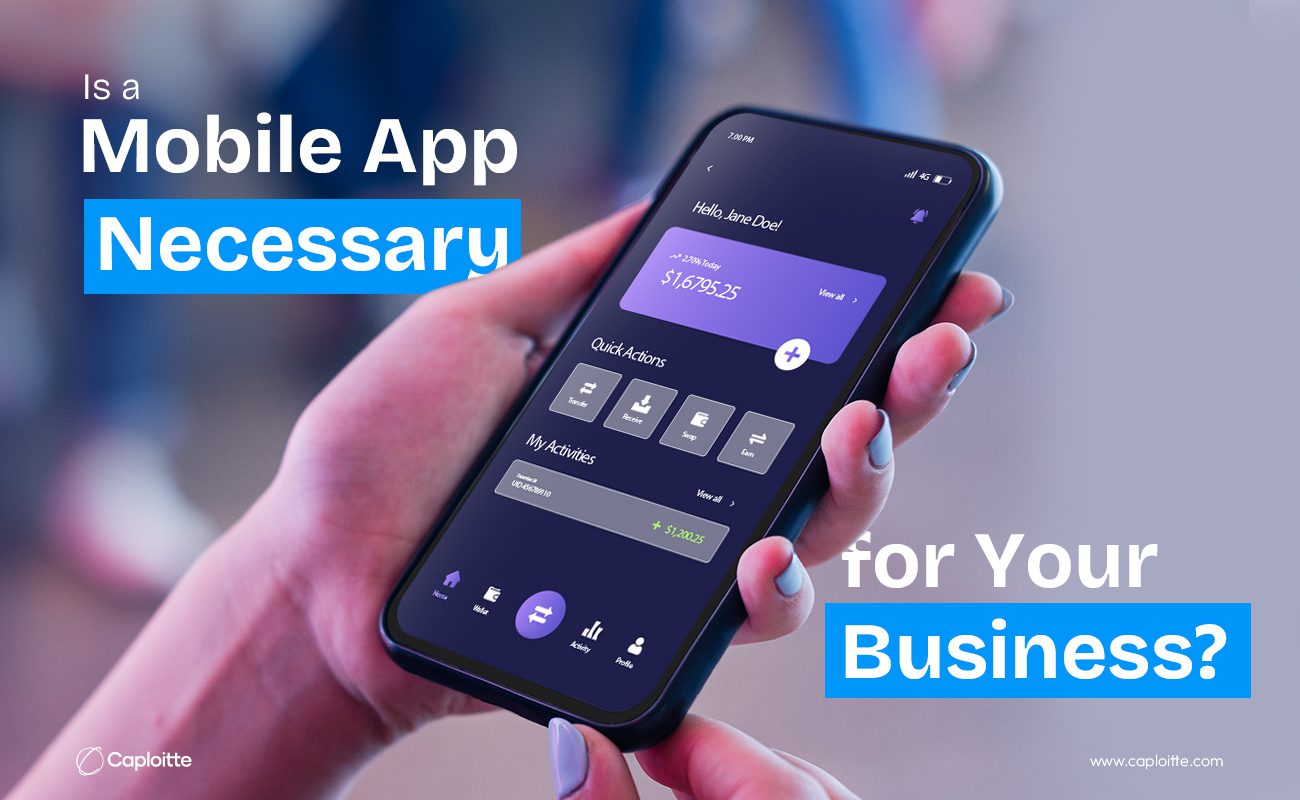
First of all, let’s address the elephant in the room, does your business really need a mobile app? Irrespective of the kind of business, a mobile application is an inventive and vital necessity for modern businesses. companies have seen a multiplication of income due to increased accessibility for both customers and companies through alerts, push notifications, various payment choices, and many other benefits.
Before the advent of mobile applications, or dynamic business solutions, valuable data collecting and processing was never so simple. Mobile applications should be your go-to tool if you want to improve your company by making it easier for customers to access. Once it has been shown that your company can profit from a mobile app, you need to decide which kind of app is best for you. It should be an easy choice to make, given that Native and Hybrid mobile applications are the two leaders in the market, but it isn’t. Other than speed, interface, and responsiveness, there is a great deal of difference between the two kinds of software programs.
What is Native Mobile App Development?
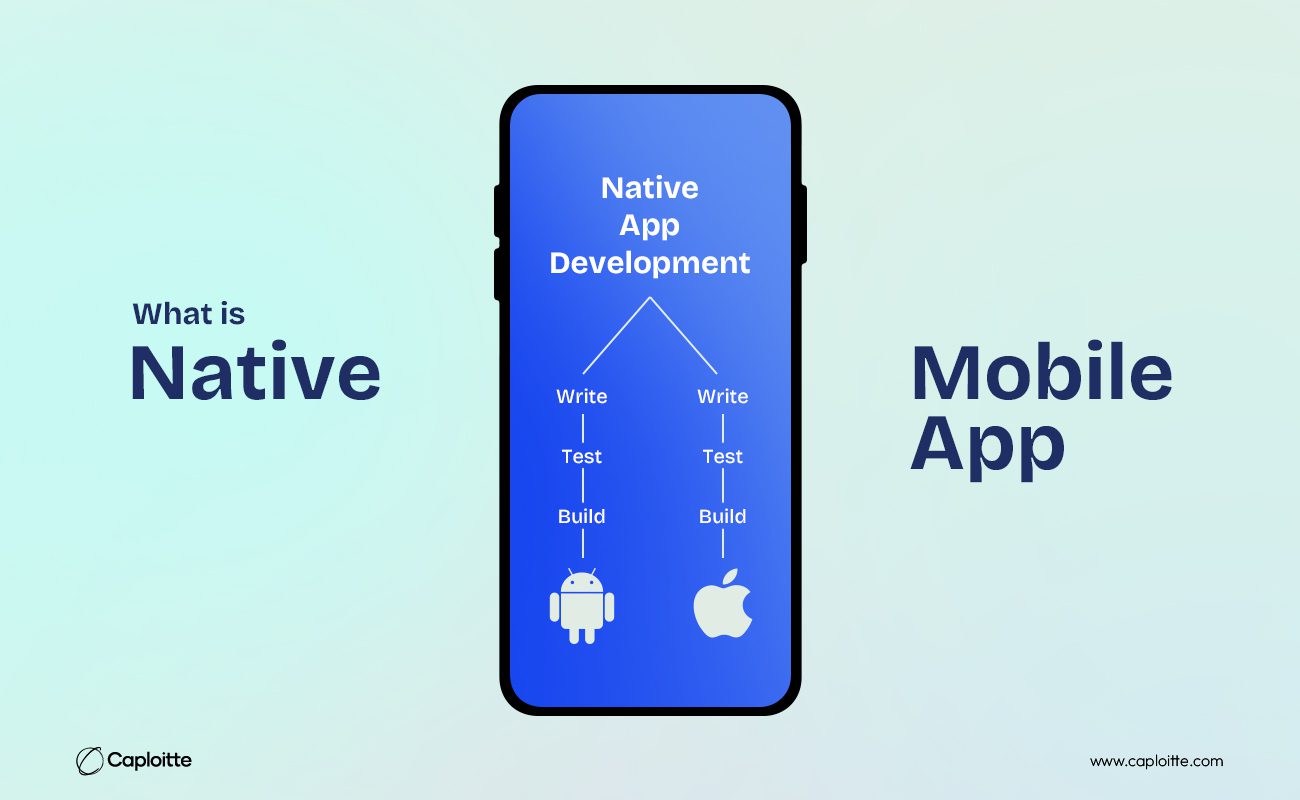
Native apps are created especially for a given device, allowing them to function flawlessly with their distinctive characteristics. With features like gestures, GPS, location services, and the camera, they can utilize the gadget to its fullest. It entails developing an application for a particular operating system (OS), such as iOS or Android.
Companies are seeing more and more benefits from native apps, such as improved speed, a dependable user experience, and robust security. They also have a greater degree of platform-specificity with Android and iOS. If you prefer to build native apps, you will need to select a programming language and make an iOS or Android decision. It goes without saying that your marketing strategy and target audience will influence this decision. Whereas iOS customers are mostly from North America and Western Europe, with more buying power and a brand-conscious mindset, Android is a more widely used platform with a broader user base and an ecosystem that is less expensive to maintain.
It’s critical to evaluate the development methodology and hybrid app development technique before starting a mobile app development project. You should also take your development team, source code, and platform approval procedure into account. Native app development is getting more effective as a result of contemporary improvements. These technologies save developers money and effort by enabling them to construct native apps from a single codebase.
Pros of Native Apps
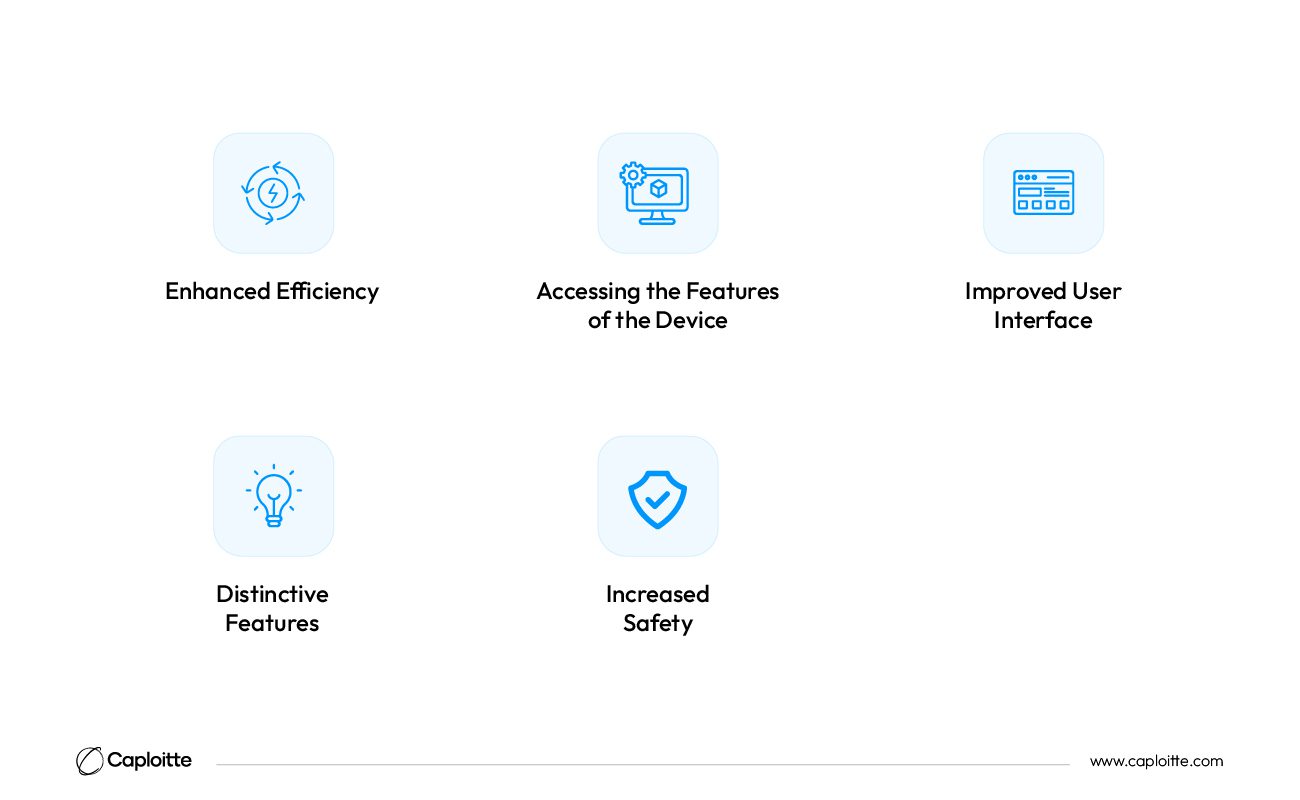
It is critical to realize that the app development process has a significant impact on how the app feels overall. For HD action games, animation projects, and software that has to be extremely responsive, native applications are a fantastic choice. The following list will assist you in identifying the many advantages of the native app development process for iOS and Android: communication.
1. Enhanced Efficiency
Developers may take full use of the hardware and software capabilities of the device by using tools and languages that are particular to that platform. Because native applications are made specifically for a given platform, users will find them to be more responsive, quicker, and more integrated with the framework in general. They can access the hardware of the gadget directly, which makes for a perfect user experience.
2. Accessing the Features of the Device
The ability to create feature-rich applications will be made possible by native apps’ easy access to the camera, microphones, GPS, gallery, and other hardware. Native app developers can offer location-based services and motion tracking if they have access to device sensors such as the magnetometer, GPS, accelerometer, and gyroscope. It may easily be combined with contemporary features like AR, VR, etc.
3. Improved User Interface
Native applications guarantee familiarity for the intended users by adhering to the design standards and rules of that particular platform, such as Material Design for Android and Human Interface rules for iOS. The user interface of native apps is genuine and easy to use, according to the platform’s design standards. It is more probable that users will feel at ease and knowledgeable about the software.
4. Distinctive Features
Native apps have the ability to store data locally on the device, giving users access to features and information even when they are offline or have restricted connectivity, in contrast to hybrid applications, which function best while connected to the internet.
5. Increased Safety
Native apps are usually more safe than hybrid apps when it comes to security. The ecosystem of the platform offers strong security features to native apps, guaranteeing user privacy and data protection. App stores apply more stringent security controls and review procedures on native programs.
Cons of Native Apps
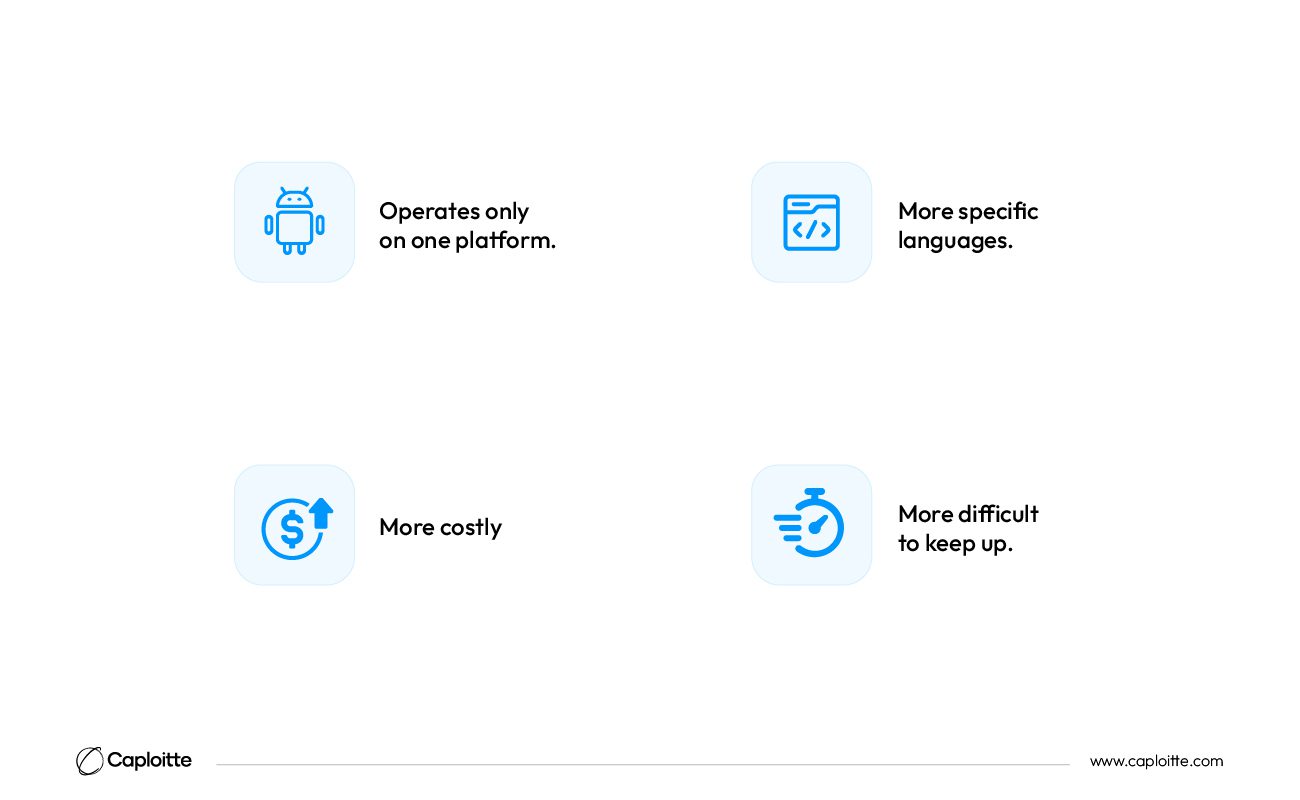
1. Operates only on one platform.
2. More specific languages.
3. More costly because distinct innovations are required for every platform.
4. More difficult to keep up.
What Is Hybrid Mobile App Development?
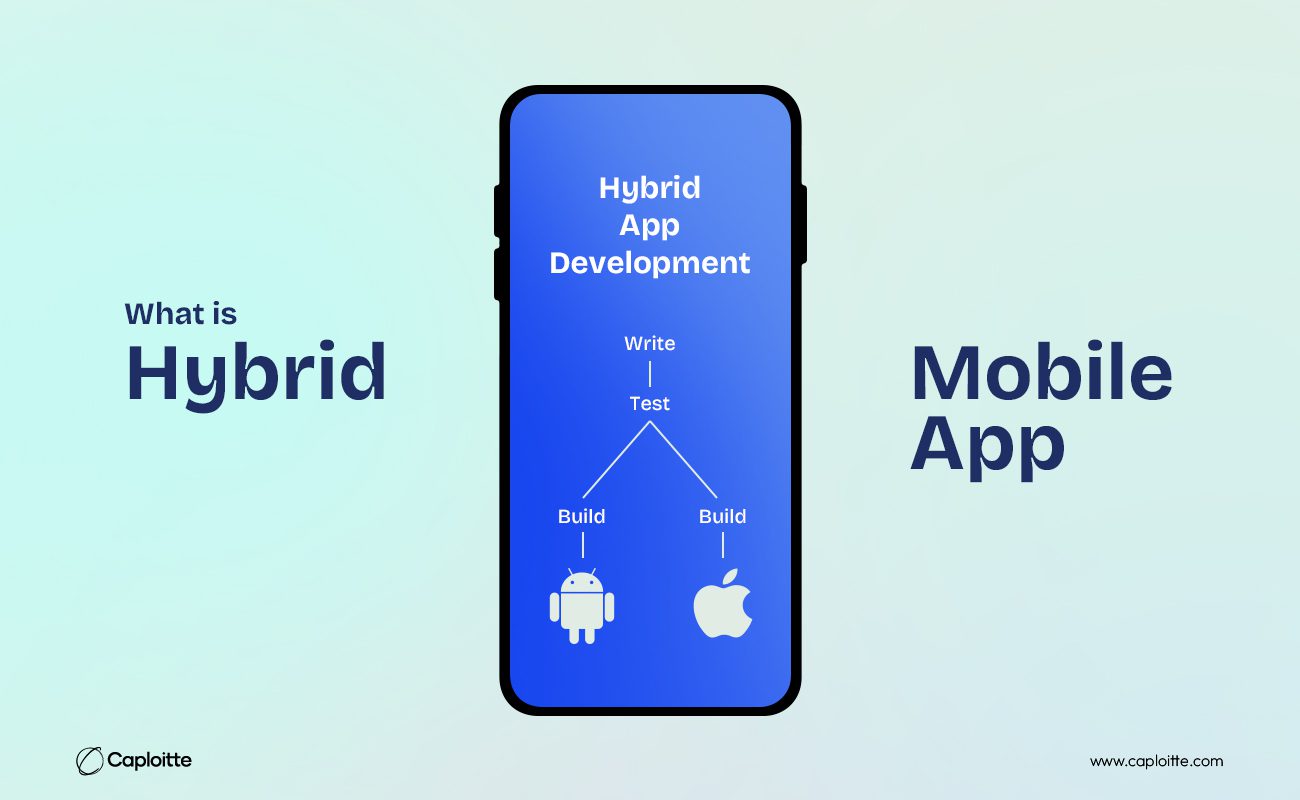
The market for hybrid app creation is expanding as well, albeit more slowly. Developing a hybrid app involves making it compatible with several platforms. Because these frameworks are appropriate for cross-platform development, they usually make use of React Native and Ionic. Businesses that have to create an app for many platforms under a constrained budget or timeframe are starting to use hybrid applications more and more.
A hybrid application is a single program that may operate on many platforms, such as iOS, Android, or Windows, and that mixes features of native programming and the web to fill in some gaps in each platform. The code just has to be written once, and it may be deployed across operating systems by developers. Because web technologies like HTML, CSS, and JavaScript are widely supported across many platforms and devices, hybrid apps may also incorporate them. So, are hybrid applications the ideal way to resolve the conflict between developing native and hybrid mobile apps?
Pros of Hybrid Apps
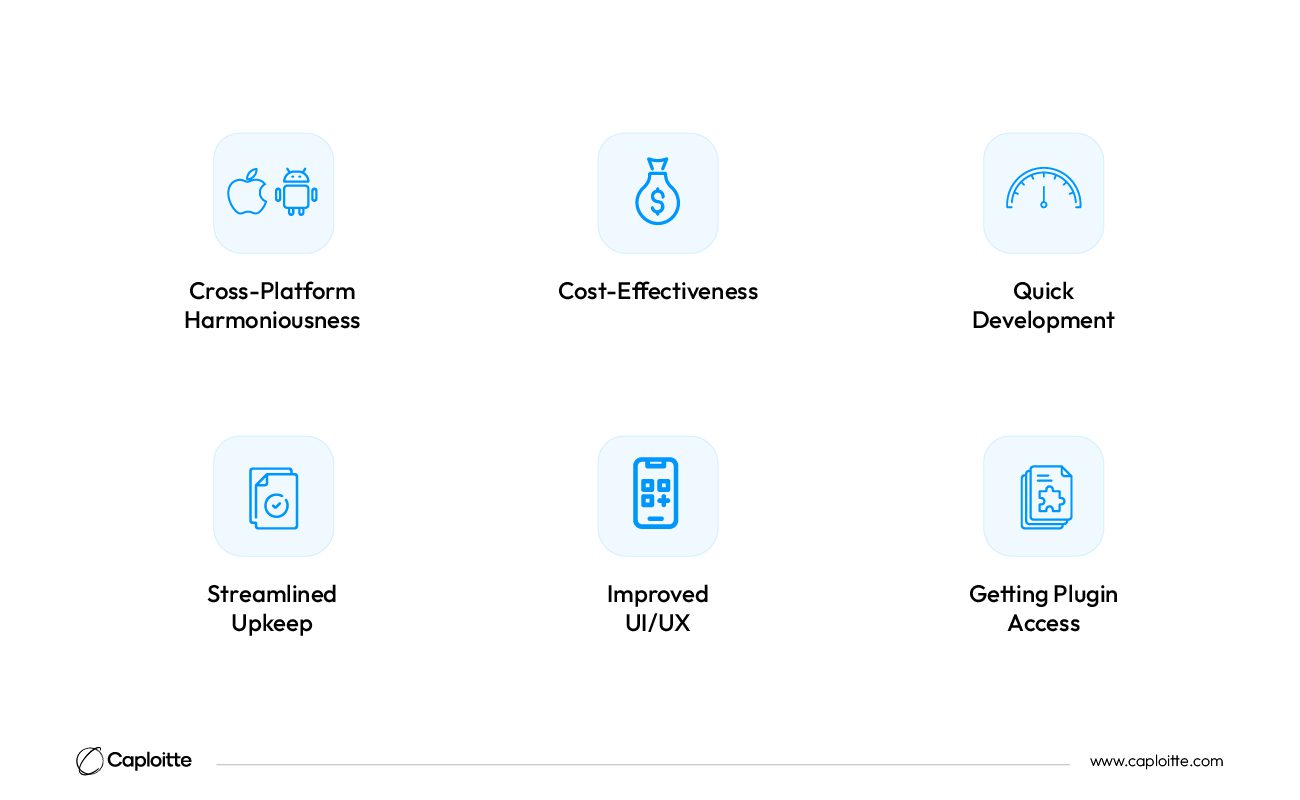
With its unique benefits, hybrid app development is becoming a popular option for organizations in the present day. An excellent choice for companies looking to introduce an app quickly and conveniently on a tight budget. Below, we’ll examine each of the many advantages of the hybrid app development process in more detail:
1. Cross-Platform Harmoniousness
The ability to utilize a single codebase across several platforms is one of the main advantages of hybrid app development. Since hybrid applications can run on both iOS and Android, they can be developed faster and for less money. Because they support several platforms, hybrid apps may be used by a wider range of users on various hardware and operating systems. The wide audience increases the likelihood of drawing in new users by improving the app’s exposure in app stores.
2. Cost-Effectiveness
Cost reductions in hybrid app development are directly related to a reduced learning path. Hybrid frameworks make it possible to create a single version that works flawlessly across several platforms, doing away with the necessity for distinct versions on different systems. Businesses don’t have to spend money on specialist training, new hires, onboarding, or more resources when developers use their existing web development expertise. Additionally, pre-built components and plugins are provided by hybrid app development frameworks, negating the need for bespoke creation—which is sometimes expensive.
3. Quick Development
The development process can be accelerated by web developers by using their current expertise to create hybrid apps. Keeping a unified codebase streamlines updates and cuts down on development work, which facilitates problem-solving and feature addition. Minimizing development cycles, developers can build and test the app only once and then distribute it across several platforms. Developers may even expedite the process by utilizing the pre-built tools and components of frameworks like React Native and Ionic.
4. Streamlined Upkeep
Multiple app versions will be easier to manage as developers won’t have to maintain distinct codebases for each platform. Furthermore, this method helps developers swiftly adopt new iOS capabilities or keep up with trends in Android app development by allowing them to make updates or modifications centrally and simultaneously release them across all platforms.
5. Improved UI/UX
With the combination of native and web app features, hybrid applications provide a remarkable user experience on both the iOS and Android platforms. Fast content loading is guaranteed by the hybrid app user interface, which enhances seamless and captivating user engagement.
6. Getting Plugin Access
Plugins and libraries are frequently accessible through hybrid frameworks, giving developers access to device functionalities.
Cons of Hybrid Apps
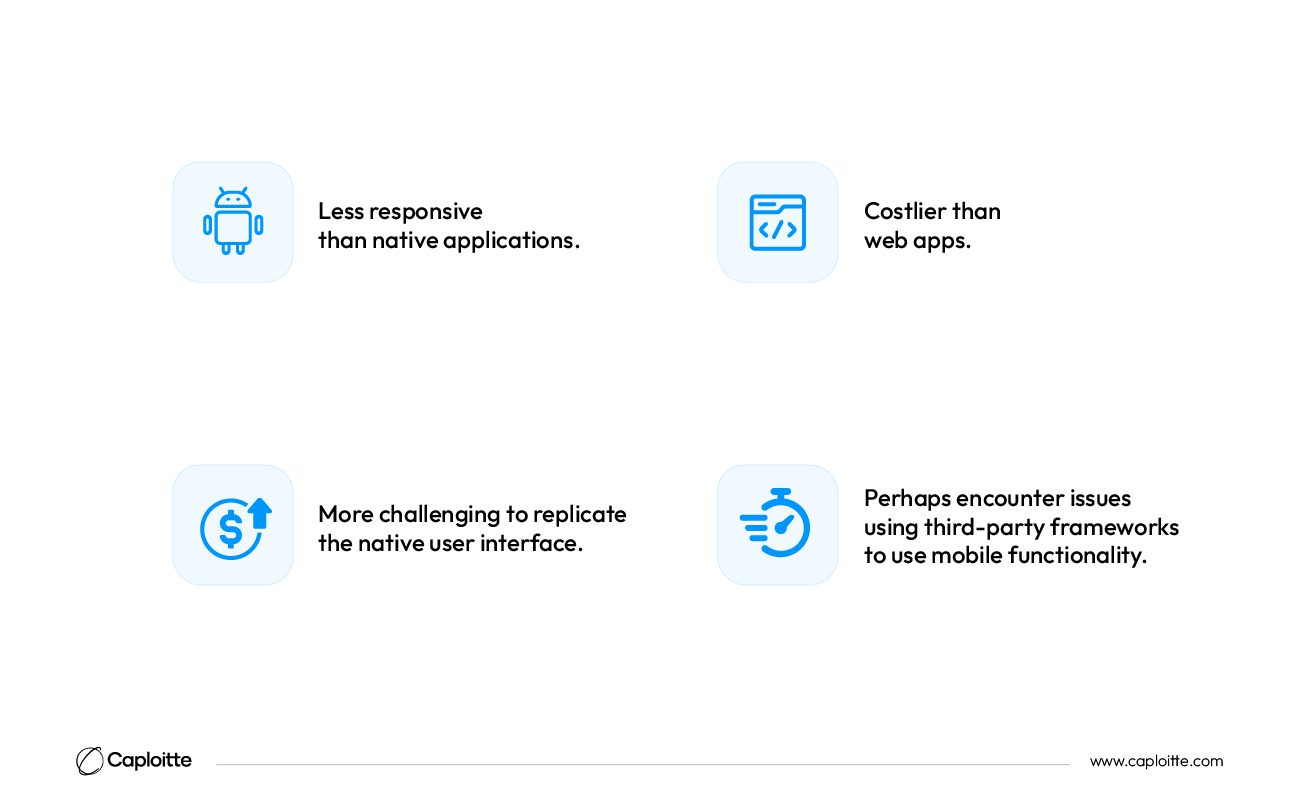
1. Less responsive than native applications.
2. Costlier than web apps.
3. More challenging to replicate the native user interface.
4. Perhaps encounter issues using third-party frameworks to use mobile functionality.
What Differentiates a Native App From a Hybrid App?

After carefully examining the many components of native vs. hybrid mobile app development above, let us assist you in understanding the differences between them based on several factors, Depending on your goals, you can design a hybrid app or a native one. Here’s a little explanation:
Native apps: Designed specifically for a single platform (iPhone or Android) to maximize functionality and provide the optimal user experience. Nevertheless, because individual applications must be developed for each platform, they cost more to build and take longer to complete.
Hybrid apps: Utilizing the same codebase, they can run on both Android and iPhone devices. This speeds up and lowers the cost of their development. They might not have as much access to certain device functions as native applications, and they might not be as quick or fluid.
Choosing between a native app (built for one platform) or a hybrid app (works on both) depends on what your app needs. If performance, specific features, or working offline are crucial, a native app is better. If development speed, cost, and having a single codebase are more important, a hybrid app might be the way to go. It also depends on your development team’s skills – if they’re web-savvy, a hybrid might be easier.
Conclusion
Selecting between native and hybrid techniques in the field of mobile app development is a decision that has to be well thought out. With their extensive feature sets and cutting-edge technological prowess, native applications can truly shine and deliver a flawless, platform-specific user experience. However, hybrid applications give businesses a quicker and more affordable development solution that is perfect for projects that need to enter the market quickly without sacrificing the quality of the final product.
Thus, it’s critical to take your organization’s specific demands and end users’ preferences into account while deciding between native and hybrid mobile app development. To make sure you make the best decision for your project, it is important to consult with mobile app development professionals. The best option will ultimately rely on the objectives, budget, and complexity of your project. Regardless of the route you take, working with a trustworthy mobile app development business will guarantee the success of your product in the cutthroat app industry.
They are both the finest of the greatest, which is the key response. The benefits of hybrid development are not diminished by the success of a single native application, as hybrid may be the ideal solution for another product’s success.
Share this post:
Read More
- All
- AI
- AR
- DevOps and CI/CD
- E-commerce
- FinTech
- IoT
- Mobile Development
- Outstaffing
- Security
- SEO
- Tech Trends
- Web Design
- Web Development




